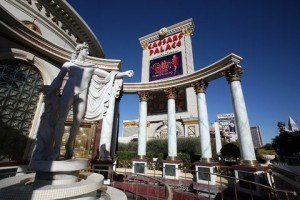
Caesars Entertainment Faces Bankruptcy Following Judge’s Decision

The World Series of Poker brand is independent from its parent company’s bankruptcy filing, but Caesars as a whole could soon be in Chapter 11 following a judge’s decision this week in Chicago. (Image: Monica Almeida/The New York Times)
Caesars Entertainment spun off Caesars Entertainment Operation Co. (CEOC) in mid-January in order to file for Chapter 11 bankruptcy, and since then the parent company to Caesars Palace, Planet Hollywood, Harrah’s, and a host of other properties spread across the country has been the subject of creditor lawsuits.
On Wednesday, US Bankruptcy Judge Benjamin Goldgar ruled that Caesars’ insolvency doesn’t prevent the corporation from facing lawsuits from its creditors.
Four hedge funds have filed litigation in an effort to recoup its loans that they claim were guaranteed by Caesars Entertainment.
Caesars had offered $400 million to those financiers, just a fraction of the $10 billion the bankruptcy action is attempting to dispose.
David Tawill, president of Maglan Capital in New York City, says the judge’s decision could lead to a “very litigious, complex and long” future for Caesars.
Guaranteed Gamble
In 2008, the recession’s hardest hit year amid worldwide financial crisis, private equity backers Apollo Global Management and TPG Capital bought Caesars, but the casino empire has plummeted into further debt over the last seven years, now owing $18.4 billion.
The Chapter 11 filing splits the organization in two, maintaining business as usual for its casino interests through Caesars Entertainment, while spinning off a new company, CEOC, a property trust to mitigate its overwhelming debts.
Creditors argue Caesars is intentionally holding too much debt and far too few assets in the casino portion in an attempt to retain ownership.
But regardless of Caesars’ insolvency, Wednesday’s ruling grants more power to Appaloosa Management, Oaktree Capital Group, Tennenbaum Capital Partners, and Centerbridge Partners, four hedge funds holding over $1 billion in Caesars’ debt, as reorganization of the corporation begins.
That could translate in the end to the creditors acquiring ownership, or at the very least control, of Caesars Entertainment.
Risk is an adherent component of gambling, and the same holds true in business, but the hedge fund creditors believe their loans were assured.
Similar to how a bank can take one’s house if the mortgage isn’t paid, Judge Goldgar’s ruling signals the same holds true in this case.
“The company lost a negotiating chip,” Erick Gordon, a University of Michigan law professor told Bloomberg Business.
WSOP Affected?
The World Series of Poker (WSOP), poker’s most visible brand and largest annual tournament, is owned by Caesars Interactive Entertainment, a subsidiary of Caesars Entertainment, but it won’t be affected by the bankruptcy according to company executives.
In a recent video press release, Gary Loveman, head of the CEOC proceedings, says the WSOP brand remains profitable online and its yearly tournament in Las Vegas continues to perform strongly. Along with Caesars Entertainment, Caesars Interactive Entertainment isn’t bankrupt and remains a separate entity from CEOC.
“It is important to note the court-supervised financial restructuring process relates solely to CEOC,” Loveman said. “The other entities that make up Caesars Entertainment including the parent company are not included in the voluntary Chapter 11 filing.”
For now, Caesars and its brand of properties and casino venues remain separate from the bankruptcy, but that could soon change should the four creditors not reach an agreeable deal with CEOC.















0 Comments